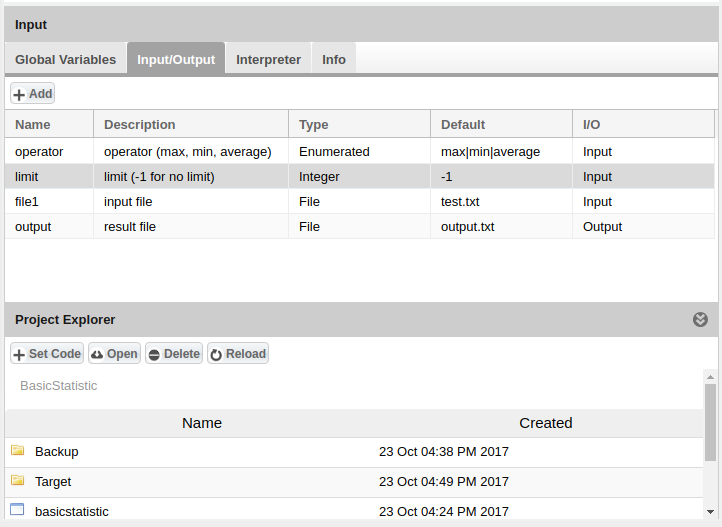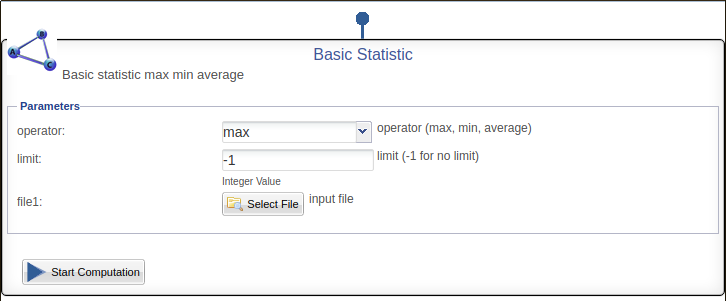Difference between revisions of "Statistical Algorithms Importer: Linux-compiled Project FAQ"
From Gcube Wiki
(→How to use the input parameters) |
(→Fortran Example) |
||
| (15 intermediate revisions by 2 users not shown) | |||
| Line 3: | Line 3: | ||
|} | |} | ||
| − | F.A.Q. of Statistical Algorithms Importer (SAI), here are common mistakes we have found in Linux-compiled Project. | + | F.A.Q. of [[Statistical_Algorithms_Importer|Statistical Algorithms Importer (SAI)]], here are common mistakes we have found in Linux-compiled Project. |
| − | == How to use the input parameters == | + | == How to use the input and output parameters (C++ Example) == |
:For example we consider BasicStatistic algorithm that use basicstatistic linux executable file: | :For example we consider BasicStatistic algorithm that use basicstatistic linux executable file: | ||
| − | [[Image:StatisticalAlgorithmsImporter_BasicStatistic0.png|thumb|center| | + | [[Image:StatisticalAlgorithmsImporter_BasicStatistic0.png|thumb|center|750px|BasicStatistic, SAI]] |
:DataMiner show the BasicStatistic algorithm in this way: | :DataMiner show the BasicStatistic algorithm in this way: | ||
| − | [[Image:StatisticalAlgorithmsImporter_BasicStatistic1.png|thumb|center| | + | [[Image:StatisticalAlgorithmsImporter_BasicStatistic1.png|thumb|center|750px|BasicStatistic in DataMiner interface, SAI]] |
| − | :C++ code in sample which generates basicstatistic linux executable file: | + | :Below the C++ code in sample which generates basicstatistic linux executable file: |
| − | + | ||
| − | < | + | <source lang="cpp"> |
//============================================================================ | //============================================================================ | ||
// Name : BasicStatistic.cpp | // Name : BasicStatistic.cpp | ||
| Line 32: | Line 32: | ||
int main(int argc, char **argv) { | int main(int argc, char **argv) { | ||
printf("BasicStatistic"); | printf("BasicStatistic"); | ||
| − | printf("Operator: %s\n",argv[1]); | + | printf("Operator: %s\n", argv[1]); |
| − | printf("Maximum number of items considered: %s\n",argv[2]); | + | printf("Maximum number of items considered: %s\n", argv[2]); |
| − | printf("Input file: %s\n",argv[3]); | + | printf("Input file: %s\n", argv[3]); |
FILE * finput; | FILE * finput; | ||
| Line 42: | Line 42: | ||
finput = fopen(argv[3], "r"); | finput = fopen(argv[3], "r"); | ||
| − | if (finput == NULL){ | + | if (finput == NULL) { |
printf("No input file found: %s\n", argv[3]); | printf("No input file found: %s\n", argv[3]); | ||
return -1; | return -1; | ||
} | } | ||
| − | int limit=atoi(argv[2]); | + | int limit = atoi(argv[2]); |
| − | int i=0; | + | int i = 0; |
| − | int value=0; | + | int value = 0; |
| − | int result=0; | + | int result = 0; |
| − | while (((read = getline(&line, &len, finput)) != -1) && (i<limit||limit==-1)) { | + | while (((read = getline(&line, &len, finput)) != -1) |
| − | printf("Retrieved line of length %zu and value: %s", read,line); | + | && (i < limit || limit == -1)) { |
| − | value=atoi(line); | + | printf("Retrieved line of length %zu and value: %s", read, line); |
| − | if(i==0){ | + | value = atoi(line); |
| − | result=value; | + | if (i == 0) { |
| + | result = value; | ||
} else { | } else { | ||
| − | if (strcmp(argv[1], "max") == 0) | + | if (strcmp(argv[1], "max") == 0) { |
| − | + | if (value > result) { | |
| − | if(value>result){ | + | result = value; |
| − | result=value; | + | |
} | } | ||
} else { | } else { | ||
| − | if (strcmp(argv[1], "min") == 0) | + | if (strcmp(argv[1], "min") == 0) { |
| − | + | if (value < result) { | |
| − | if(value<result){ | + | result = value; |
| − | result=value; | + | |
} | } | ||
} else { | } else { | ||
| − | if (strcmp(argv[1], "average") == 0) | + | if (strcmp(argv[1], "average") == 0) { |
| − | + | result = result + value; | |
| − | result= | + | |
} else { | } else { | ||
break; | break; | ||
| Line 81: | Line 79: | ||
i++; | i++; | ||
| + | } | ||
| + | |||
| + | if (strcmp(argv[1], "average") == 0 && i > 0) { | ||
| + | result = result / i; | ||
} | } | ||
fclose(finput); | fclose(finput); | ||
| − | if (line){ | + | if (line) { |
free(line); | free(line); | ||
} | } | ||
| Line 90: | Line 92: | ||
//Write result | //Write result | ||
FILE *foutput = fopen("output.txt", "w"); | FILE *foutput = fopen("output.txt", "w"); | ||
| − | if (foutput == NULL) | + | if (foutput == NULL) { |
| − | + | ||
printf("Error opening file!\n"); | printf("Error opening file!\n"); | ||
return -1; | return -1; | ||
| Line 102: | Line 103: | ||
return 0; | return 0; | ||
} | } | ||
| − | </ | + | </source> |
:test.txt: | :test.txt: | ||
| Line 115: | Line 116: | ||
100 | 100 | ||
</pre> | </pre> | ||
| − | |||
:with basicstatistic max -1 test.txt, output.txt: | :with basicstatistic max -1 test.txt, output.txt: | ||
| Line 126: | Line 126: | ||
[[File:BasicStatistic.zip|BasicStatistic.zip]] | [[File:BasicStatistic.zip|BasicStatistic.zip]] | ||
| + | |||
| + | == Fortran Example == | ||
| + | :For example we consider Fortran Statistic algorithm and we will use its executable version fortran-statistic.sh in SAI in this way: | ||
| + | [[Image:StatisticalAlgorithmsImporter_FortranStatistic1.png|thumb|center|750px|FortranStatistic, SAI]] | ||
| + | |||
| + | :DataMiner show the Fortran Statistic algorithm in this way: | ||
| + | [[Image:StatisticalAlgorithmsImporter_FortranStatistic2.png|thumb|center|750px|FortranStatistic in DataMiner interface, SAI]] | ||
| + | |||
| + | |||
| + | :values.txt: | ||
| + | <pre style="display:block;font-family:monospace;white-space:pre;margin:1em 0;"> | ||
| + | 10 | ||
| + | 20 | ||
| + | 30 | ||
| + | 40 | ||
| + | 50 | ||
| + | 60 | ||
| + | 70 | ||
| + | 80 | ||
| + | 90 | ||
| + | 100 | ||
| + | </pre> | ||
| + | |||
| + | :with fortran-statistic.sh values.txt avg, result.txt: | ||
| + | <pre style="display:block;font-family:monospace;white-space:pre;margin:1em 0;"> | ||
| + | The result is: 55 | ||
| + | </pre> | ||
| + | |||
| + | :FortranStatistic code: | ||
| + | [[File:FortranStatistic.zip|FortranStatistic.zip]] | ||
[[Category:Statistical Algorithms Importer]] | [[Category:Statistical Algorithms Importer]] | ||
Latest revision as of 18:13, 30 May 2019
F.A.Q. of Statistical Algorithms Importer (SAI), here are common mistakes we have found in Linux-compiled Project.
How to use the input and output parameters (C++ Example)
- For example we consider BasicStatistic algorithm that use basicstatistic linux executable file:
- DataMiner show the BasicStatistic algorithm in this way:
- Below the C++ code in sample which generates basicstatistic linux executable file:
//============================================================================ // Name : BasicStatistic.cpp // Author : Giancarlo Panichi // Version : // Copyright : GNU GENERAL PUBLIC LICENSE. Version 3.0 // Description : BasicStatistic in C++, Ansi-style //============================================================================ #include <iostream> #include <stdio.h> #include <stdlib.h> #include <string.h> using namespace std; int main(int argc, char **argv) { printf("BasicStatistic"); printf("Operator: %s\n", argv[1]); printf("Maximum number of items considered: %s\n", argv[2]); printf("Input file: %s\n", argv[3]); FILE * finput; char * line = NULL; size_t len = 0; ssize_t read; finput = fopen(argv[3], "r"); if (finput == NULL) { printf("No input file found: %s\n", argv[3]); return -1; } int limit = atoi(argv[2]); int i = 0; int value = 0; int result = 0; while (((read = getline(&line, &len, finput)) != -1) && (i < limit || limit == -1)) { printf("Retrieved line of length %zu and value: %s", read, line); value = atoi(line); if (i == 0) { result = value; } else { if (strcmp(argv[1], "max") == 0) { if (value > result) { result = value; } } else { if (strcmp(argv[1], "min") == 0) { if (value < result) { result = value; } } else { if (strcmp(argv[1], "average") == 0) { result = result + value; } else { break; } } } } i++; } if (strcmp(argv[1], "average") == 0 && i > 0) { result = result / i; } fclose(finput); if (line) { free(line); } //Write result FILE *foutput = fopen("output.txt", "w"); if (foutput == NULL) { printf("Error opening file!\n"); return -1; } fprintf(foutput, "BasicStatistic Result: \n"); fprintf(foutput, "%d\n", result); fclose(foutput); return 0; }
- test.txt:
9 20 12 23 44 65 80 100
- with basicstatistic max -1 test.txt, output.txt:
BasicStatistic Result: 100
- BasicStatistic code:
Fortran Example
- For example we consider Fortran Statistic algorithm and we will use its executable version fortran-statistic.sh in SAI in this way:
- DataMiner show the Fortran Statistic algorithm in this way:
- values.txt:
10 20 30 40 50 60 70 80 90 100
- with fortran-statistic.sh values.txt avg, result.txt:
The result is: 55
- FortranStatistic code:



